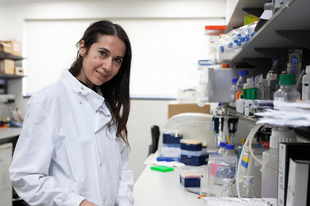A Day In The Life with Professor Christina Fotopoulou
Professor Christina Fotopoulou is a gynaecological oncology consultant surgeon at Hammersmith Hospital, Imperial College NHS Trust and Deputy Director of the Ovarian Cancer Action Research Centre. She holds the Chair for Gynaecological Cancer Surgery at Imperial College in London and is also the director of Women’s Health at King Edward VII’s Hospital.

Professor Christina Fotopoulou
Christina is one of the leading specialists in women’s health internationally. Christina performs surgery to help treat some of the most complex women’s cancers - from ovarian to cervical. She lives in London with her husband and two children. Here she opens up about her life as a cancer surgeon and why being part of her patients’ lives is a privilege.
My alarm goes off...
My alarm doesn’t go off. I will rarely need to put on an alarm. I have a three-year-old daughter who always wakes me up around five to six o’clock to give her milk. Then my son wakes up and I have a couple of hours with them before they go to school and before I go to work.
I am responsible for...
The treatment and surgery of patients with advanced gynaecological cancers in our centre together with an amazing multidisciplinary team of experts. I am the Programme Lead for our gynaecological oncology trainees. I receive second-opinion referrals for surgery for advanced, usually ovarian, cancer from other cancer centres in the UK including Wales and Scotland. I also lead a research group in the College studying the biology of ovarian cancer.
I started my job because...
I always wanted to be a surgeon. My mother is a pediatrician, and my father is a general surgeon. Before I even started in medicine, my father would often take me to theatre so it was almost inevitable I would follow that route. In the first year of my medical studies, I did an elective on a gynaecological cancer ward, and I saw the suffering of advanced ovarian cancer patients who back then, more than 25 years ago, had even fewer options than today. I thought to myself, ‘these are the women that I would like to be able to help.’
Before I even started in medicine, my father would often take me to theatre so it was almost inevitable I would follow that route.
My typical week...
I will usually perform two or three cancer operations per day. On Mondays, I have my oncology outpatient clinic where I will see all my pre and postoperative patients but also long term survivors for their follow-up. The rest of the time I distribute between research, teaching, writing and giving lectures. I also travel a fair bit due to my commitment to various international committees, mostly to develop best practices into guidelines for other practitioners.
My most memorable work moment...
Oh, there are many! The most important moment is when a patient wake from an operation and I tell her that everything went well. Also, when I see my trainees having reached their potential so that they can implement what they have learnt and in turn help more and more women.
The worst part of my job...
When my patients don’t do very well after surgery. That keeps every surgeon up at night.
What’s the one thing that you would tell people about oncology?
Oncology is a very special field in medicine. Oncologists are very privileged to be able to treat cancer patients. We are practically their companions on their journeys. Our goal is not just to cure, but also to prolong remission, prolong survival and improve the quality of life and that is what makes our field so very special.
If you had one wish for the future, what would it be?
To continue to improve and prolong the lives of patients with ovarian cancer.